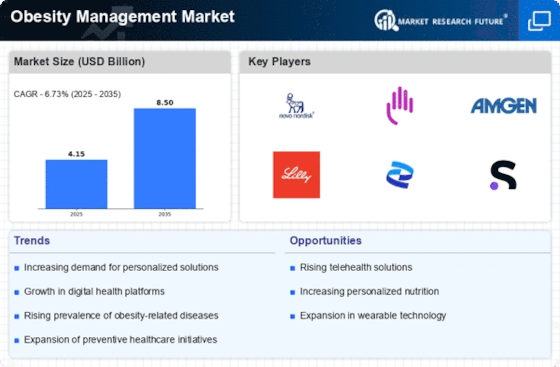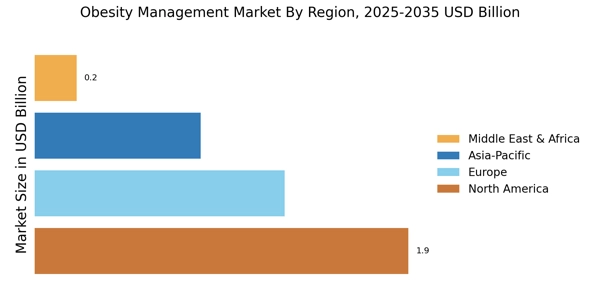Increasing Prevalence of Obesity
The rising prevalence of obesity is a primary driver of the Obesity Management Market. According to recent data, approximately 42% of adults in certain regions are classified as obese, a figure that has steadily increased over the past few decades. This alarming trend is attributed to various factors, including sedentary lifestyles, poor dietary habits, and genetic predispositions. As the number of individuals affected by obesity continues to grow, the demand for effective management solutions, including medications, surgical interventions, and lifestyle modification programs, is likely to escalate. Consequently, healthcare providers and organizations are increasingly focusing on developing comprehensive strategies to address this public health crisis, thereby propelling the Obesity Management Market forward.
Growing Awareness of Health Risks
There is an increasing awareness of the health risks associated with obesity, which serves as a significant driver for the Obesity Management Market. Public health campaigns and educational initiatives have highlighted the link between obesity and chronic diseases such as diabetes, cardiovascular diseases, and certain cancers. This heightened awareness is prompting individuals to seek out effective obesity management solutions. As a result, healthcare systems are prioritizing obesity prevention and treatment programs, leading to a surge in demand for weight loss medications, nutritional counseling, and fitness programs. The emphasis on health and wellness is likely to continue influencing consumer behavior, thereby fostering growth within the Obesity Management Market.
Advancements in Medical Technology
Technological advancements play a crucial role in shaping the Obesity Management Market. Innovations such as minimally invasive surgical techniques, wearable health devices, and mobile health applications are transforming how obesity is managed. For instance, the introduction of laparoscopic bariatric surgery has significantly improved patient outcomes and reduced recovery times. Furthermore, the integration of artificial intelligence in personalized treatment plans allows for more tailored approaches to obesity management. As these technologies continue to evolve, they are expected to enhance the effectiveness of obesity interventions, thereby attracting more patients and healthcare providers to the Obesity Management Market. The potential for improved patient engagement and adherence to treatment regimens is also noteworthy.
Regulatory Support and Policy Initiatives
Regulatory support and policy initiatives are increasingly shaping the landscape of the Obesity Management Market. Governments and health organizations are implementing policies aimed at combating obesity, such as nutritional labeling regulations, taxes on sugary beverages, and funding for obesity prevention programs. These initiatives not only raise awareness but also create a conducive environment for the development and adoption of obesity management solutions. For instance, funding for research into obesity treatments and preventive measures is likely to increase, fostering innovation within the industry. As regulatory frameworks evolve, they may provide additional incentives for companies to invest in the Obesity Management Market, ultimately benefiting public health.
Rising Demand for Weight Loss & Obesity Management Solutions
The rising demand for Weight Loss & Obesity Management solutions is a pivotal driver of the Obesity Management Market. As societal norms increasingly favor healthier body images, individuals are actively seeking effective methods to manage their weight. This trend is reflected in the growing market for weight loss products, including dietary supplements, meal replacement shakes, and fitness programs. Additionally, the proliferation of online platforms offering weight loss coaching and support has made these solutions more accessible. The increasing consumer focus on health and wellness is likely to sustain this demand, prompting businesses to innovate and expand their offerings within the Obesity Management Market. This dynamic environment presents opportunities for both established companies and new entrants.

















